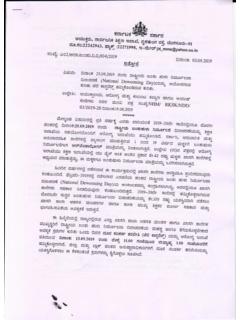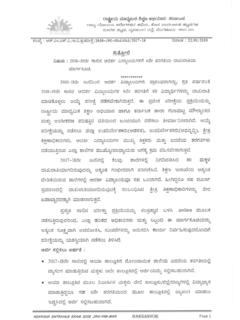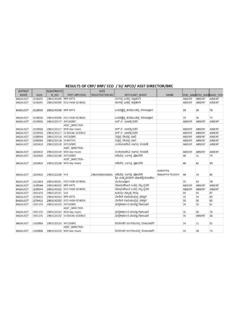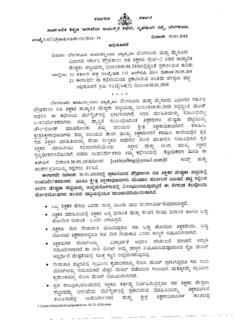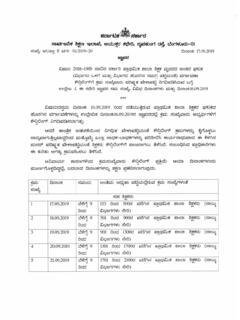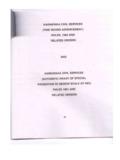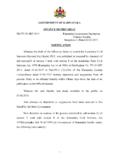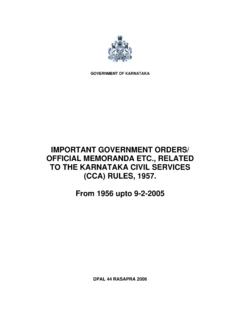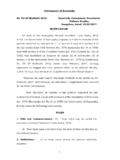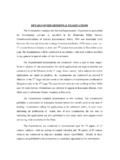Transcription of chapter 14 terms and conditions of services of ... - Karnataka
1 chapter XIV terms and conditions of service of employees in private educational institutions 87. Qualification, conditions and Service of employees:- The state government may after previous publication make rules regulating the recruitment and conditions of service (including rights as regards disciplinary matters) of the employees in recognized private educational institutions. Providing that the minimum qualification for recruitment, age of recruitment, and retirement and benefits of retirement for employees in educational institutions receiving maintenance grant from the state government shall be the same as those applicable for the corresponding category of employees, if any, in the state institutions unless otherwise prescribed. 88. Appointment of employees: No person who does not possess the requisite qualifications prescribed under section 87 shall on and from the date of commencement of this Act be appointed as an employee in a recognized private educational institutions.
2 89. Pay and allowances of teachers and other employees: The pay and allowances of persons employed in the recognized private institutions shall be paid on or before such day in every month, in such manner and by or through such officer or authority as may be prescribed. 90. Schedule of employment to be maintained:- (1) Every private educational institution shall maintain a schedule of employees indicating therein the number of persons in its employment, the name and qualification of each employee, the grade of pay and such other particulars as may be prescribed. (2) Within three months from the date of commencement of this act and within a like period after any alteration in such schedule is made, private educational institutions shall submit a copy of the schedule or alterations made therein, as the case may be notified for this purpose.
3 (3)The schedule of appointments for the time being in force shall be kept at the office of the private educational institution and shall during office hours, be open free of charge, to inspection by any employee of that private educational institution. The names and qualifications of the teaching staff shall be displayed in the prominent place in the institution. 91. Code of Conduct:- (1) Every employee of a private educational institutions shall be governed by the prescribed code of conduct and if he violates any provision thereof he shall be liable for the prescribed disciplinary action. (2) The managing committee may with prior approval of the state government or any authority authorized in this behalf by the state government also prescribe standards of conduct to be observed by the employees, provided they are not inconsistent with those prescribed under sub-section (1).
4 92. Dismissal, removal etc:- (1) Subject to such rules as may be made in this behalf no teacher or other employee of a private educational institutions shall be dismissed, removed or reduced in rank except,- (a) in accordance with the conditions of service governing him; (b) after an inquiry, in which he has been informed of the charges against him and given a reasonable opportunity of being heard in respect of the said charges, and where it is proposed after such inquiry to impose on him such penalty, it may impose such penalty, on the basis of the evidence adduced during such inquiry. Providing that this sub-section shall not apply to temporary employees or to the dismissal, removal or reduction in rank of a teacher or other employee on the ground of misconduct which has led to his conviction on a criminal charge involving moral turpitude.
5 (2) No order imposing any penalty other than those referred to in sub-section (1) shall be passed except after:- (a) the teacher or employee is informed in writing of the proposal to take action against him and of the allegation on which it is proposed to be taken and given an opportunity to make any representation which he may wish to make; and (b) Such representation, if any is taken into consideration. (3) (a) A teacher or other employee may be placed under suspension by the managing committee. (i) Where disciplinary proceeding against him is contemplated or is pending; or (ii) Where a case against him in respect of any criminal offence is under investigation or trial. (b) No such suspension shall remain in force for more than six months; Provide that if the enquiry is not completed within the period of six months, the secretary shall report the matter to the competent authority, who may permit extension of the period of suspension beyond six months, if he is satisfied that the enquiry could not be so completed due to circumstances beyond the control of the governing council.
6 (c) the managing committee placing and employee under suspension shall forthwith report to the competent authority the circumstances in which the order was made. (d) Subject to such rules as may be prescribed, every employee placed under suspension under this section shall be entitled to such subsistence allowance as may be prescribed. 93. Communication of order:- (1) Every order of the managing committee imposing any penalty or otherwise affecting the conditions of service of an employee to his prejudice, shall be communicated to the employee in the prescribed manner. (2) No order which has not been communicated in accordance with sub-section (1) shall be valid or be of any effect whatsoever. :- (1) any teacher or other employee of a private educational institution who is dismissed, removed or reduced in rank may within three months from the date of communication of the order prefer an appeal to the tribunal.
7 (2) The provisions of sections 4 and 5 of the limitation Act, 1963 shall be applicable to such an appeal. (3) If, before the date of commencement of this Act, any teacher or other employees has been dismissed, or removed or reduced in rank or his appointment has been otherwise terminated and any appeal preferred before that date. (a) by him against such dismissal or removal or reduction in rank or termination; or (b) by him or by the governing council against any order made in any appeal referred to in clause (a); is pending before any officer, such appeal shall, not withstanding anything in sub-section (1)stand transferred to the tribunal, if he makes an application in that behalf to such officer.
8 (4) The Tribunal shall dispose of the appeal filed under sub-section (1) or transferred under sub-section (3) after giving the parties the opportunity of being heard. (5) In respect of an order imposing a penalty other than those specified in sub-section (1) of section 92, on any teacher or other employee, an appeal shall lie to the competent authority within three months from the date of communication of the order imposing of being heard. (6) The competent authority shall dispose of an appeal preferred under Sub-section (5) after giving the parties the opportunity of being heard. (7) An appeal against an order of the competent authority under sub-section (6) shall lie within the prescribed period to the tribunal, whose decision shall be final.
9 95. Court fee: Notwithstanding anything in the Karnataka court fees and suits valuation Act, 1958, every appeal to the tribunal shall bear a court fee stamp of Rupees twenty five. 96. Tribunal : (1) The state government shall, by notification in the official gazette constitutes one or more educational appellate tribunals for the adjudication of appeals preferred under this act and were more than one tribunal is constituted, the state government shall specify the territorial jurisdiction of each such tribunal. (2) The educational appellate tribunal shall consist of one person who is or has been a judicial officer not below the rank of district judge. Provided that pending constitution of the educational appellate tribunal under sub-section (1), the district judge of each district shall function as the educational appellate tribunal of the district.
10 (3) The Education appellate tribunal (a) may, if satisfied from the material on record that the order is arbitrary, perverse, malafide, violative of the rules of naturals justice or not sustainable on any other ground, pass such orders including one for the reinstatement of the employee, as it deems fit on such terms and conditions , if any, including payment of salary allowances and costs; (b) shall for the purposes of the disposal of the appeals referred under this Act have the same powers as are vested in a court of appeal under the Code of Civil Procedure, 1908 (Central Act 5 of 1908) (c) shall have the power to stay the operation of the order appealed against on such terms as it may think fit; (d) shall for the purpose of executing its own orders have the same powers as are vested in a court executing a decree of a civil court under the code of Civil Procedure, 1908 (Central Act 5 of 1908) as if such orders were decrees of a civil court.
